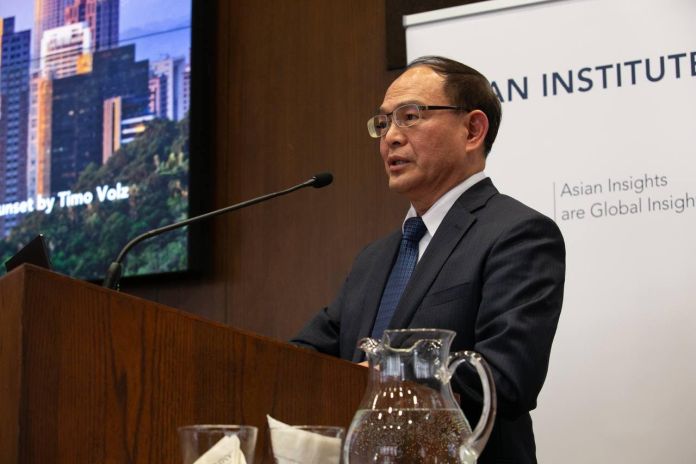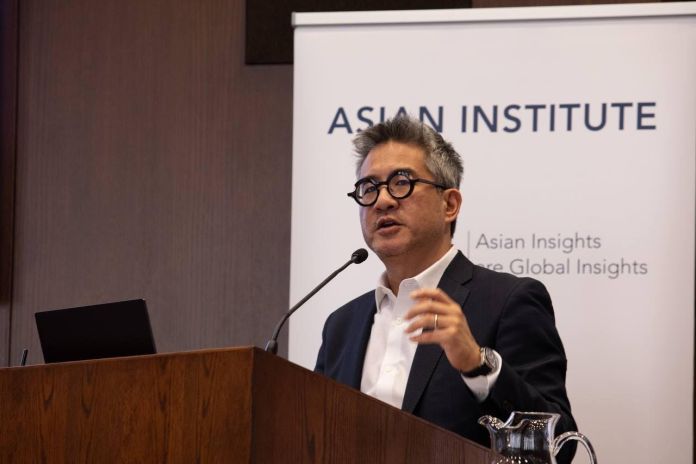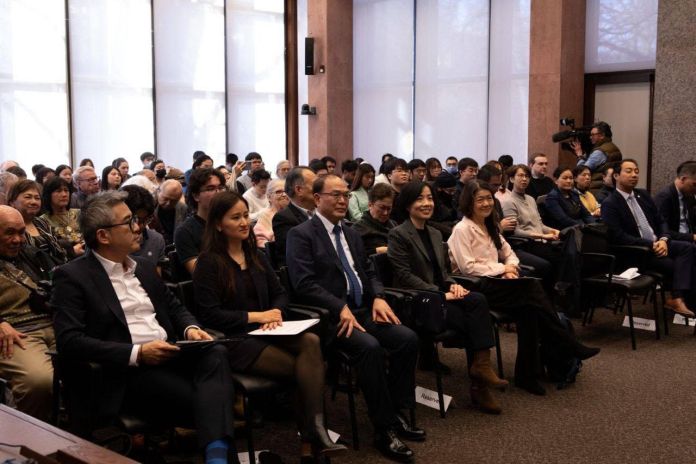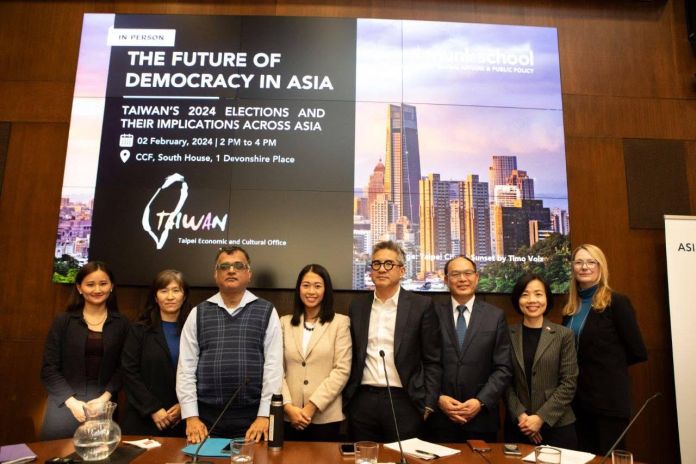By TECO Toronto
TORONTO, Canada – On the afternoon of February 2, the Taipei Economic and Cultural Office in Toronto, in collaboration with the Asian Institute at the Munk School of Global Affairs & Public Policy, University of Toronto (UofT), organized a seminar titled “The Future of Democracy in Asia: Taiwan’s 2024 Election and its Impact on Asia.”
The seminar was presented by Professor Joseph Wong, vice-president of the University of Toronto, with Ambassador Harry Ho-jen Tseng from the Taipei Economic and Cultural Office in Canada attending and delivering a speech. The event saw enthusiastic participation from various sectors in Toronto, demonstrating Canada’s keen interest in Taiwan’s elections and the future of democracy in Asia.

Ambassador Tseng expressed that despite the intense competition in Taiwan’s presidential election, the public returned to their normal lives the day after the election. The defeated candidates acknowledged their loss, congratulated the winners, and pledged to oversee the government’s future governance, showcasing the maturity and stability of Taiwan’s democracy. He also highlighted the extensive and in-depth discussions among candidates during pre-election debates on issues related to national identity and cross-strait relations.
Taiwan’s elections demonstrated the undeniable resilience and advantages of democracy, especially in the face of global challenges and threats. Taiwan successfully resisted malicious attempts to manipulate the election, strengthening its democratic political system after multiple election cycles and serving as an inspiring example for the future of democracy in Asia.
Vice-President Joseph Wong, who specializes in the study of democratic transition in Asia, visited Taiwan last month with several American international relations scholars for election observation. During the seminar, he presented a talk titled “Boring Elections Are Good Elections: Reflections on Democracy in Taiwan,” sharing his observations and analysis of Taiwan’s presidential elections. He emphasized that while the election appeared smooth and therefore, seemingly boring, it was an extraordinary achievement of democratic maturity, demonstrating remarkable resilience in the face of threats.

Wong stressed that democracy is not only about winning but also about respecting opponents and gracefully accepting defeat. He provided insightful analysis of the shifts in the political spectrum of Taiwan’s blue and green parties in recent years, public sentiments, and the impact and lessons of Taiwan’s democratic elections on authoritarian politics, as well as the possible future path of democratization in China.
Three professors and researchers from the Munk School, Yoonkyung Lee, Bharat Punjabi, and Irene Poetranto, were also invited to speak at the seminar, presenting the current status and challenges of democratic development in South Korea, India, Indonesia, and Myanmar, respectively. The audience actively participated in the Q&A session, raising questions on how Taiwan’s elections cope with external interference and disinformation campaigns, the political orientation and demands of young voters, the role of civil society and media in oversight, and the insights Taiwan’s democracy brings to the broader Asian region.
After the seminar, Director General Jin-Ling Chen of the Taipei Economic and Cultural Office, Toronto remarked that on November 9, 2022, Canadian Foreign Minister Mélanie Joly was invited to visit the University of Toronto and delivered a speech, describing China as a global disruptive power. Minister Joly reminded Canadian businesses to be vigilant in economic and trade exchanges with authoritarian countries. She also pointed out the need to strengthen cooperation with countries in the Indo-Pacific region, including Taiwan. Two weeks after the speech, Canada officially announced its Indo-Pacific strategy.

Director General Chen further stated that holding a seminar on the future of democracy in Asia, particularly focusing on Taiwan’s elections, in the same venue where Minister Joly spoke echoes Canada’s Indo-Pacific strategic goals. The seminar deepens Canada’s understanding of the Indo-Pacific region and strengthens the connections and interactions between Canada and the region, aligning with the principles of mutual benefit and multilateral cooperation. The seminar was deemed highly successful, as it provided a platform for academic discussion.
Attendees included Rachel Silvey, Director of the Asian Institute at the University of Toronto, Canadian Member of Parliament Kevin Vuong, faculty and students from the University of Toronto, as well as nearly 200 participants from the Taiwanese community in Toronto, business sector, think tanks, consulates, and media. A reception was held after the seminar, providing an opportunity for participants to engage in relaxed discussions on democracy-related issues.”







